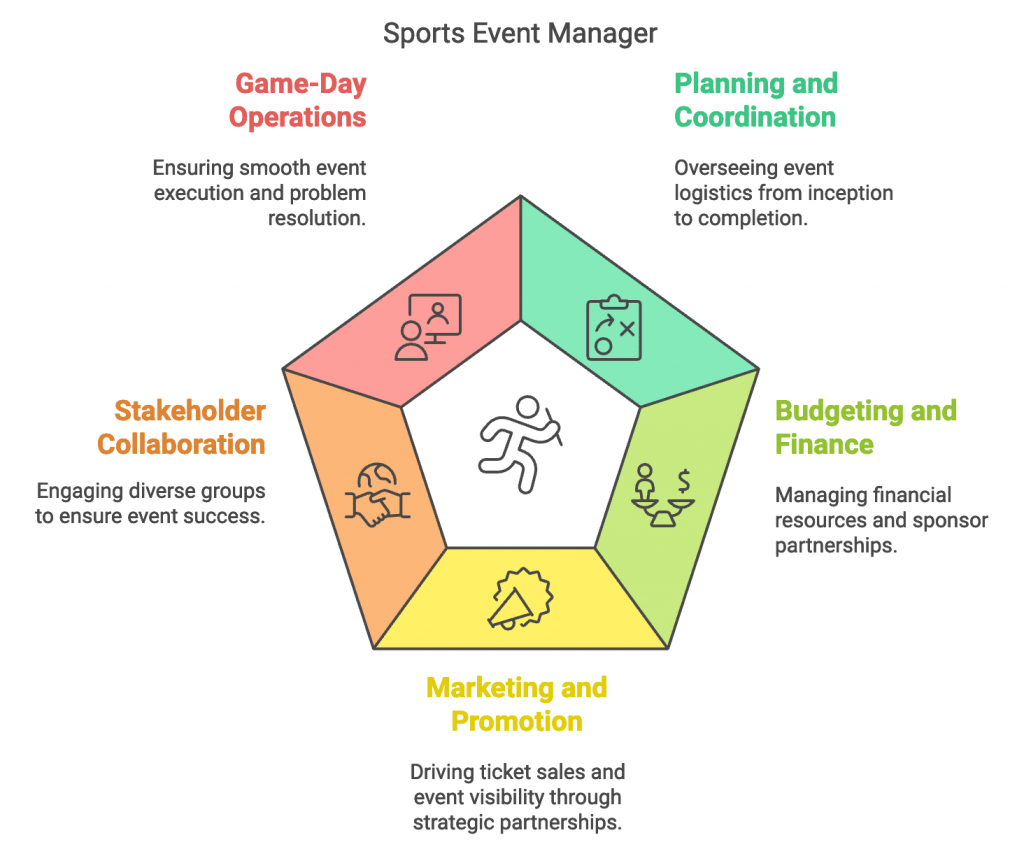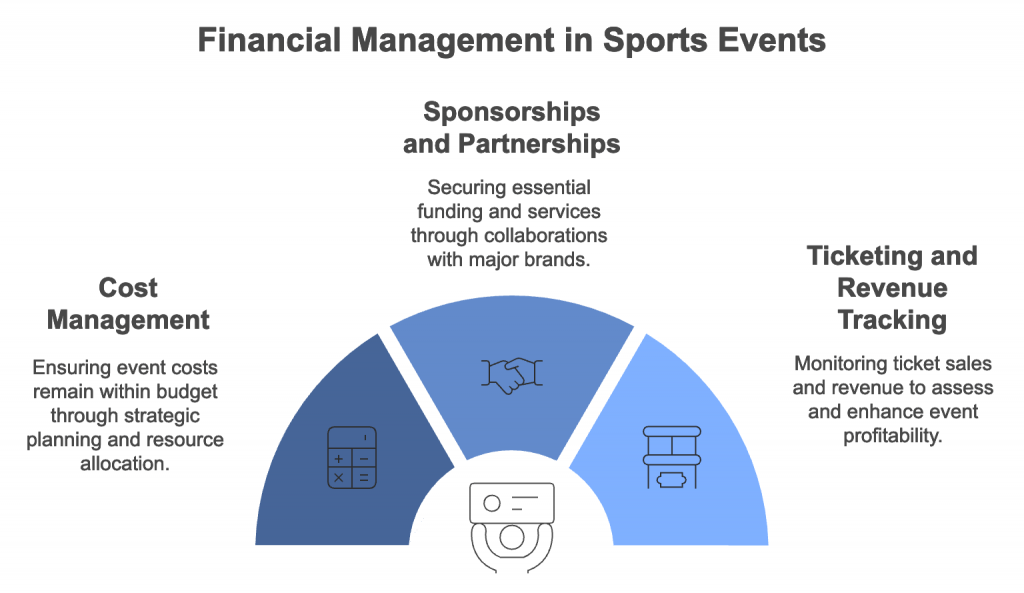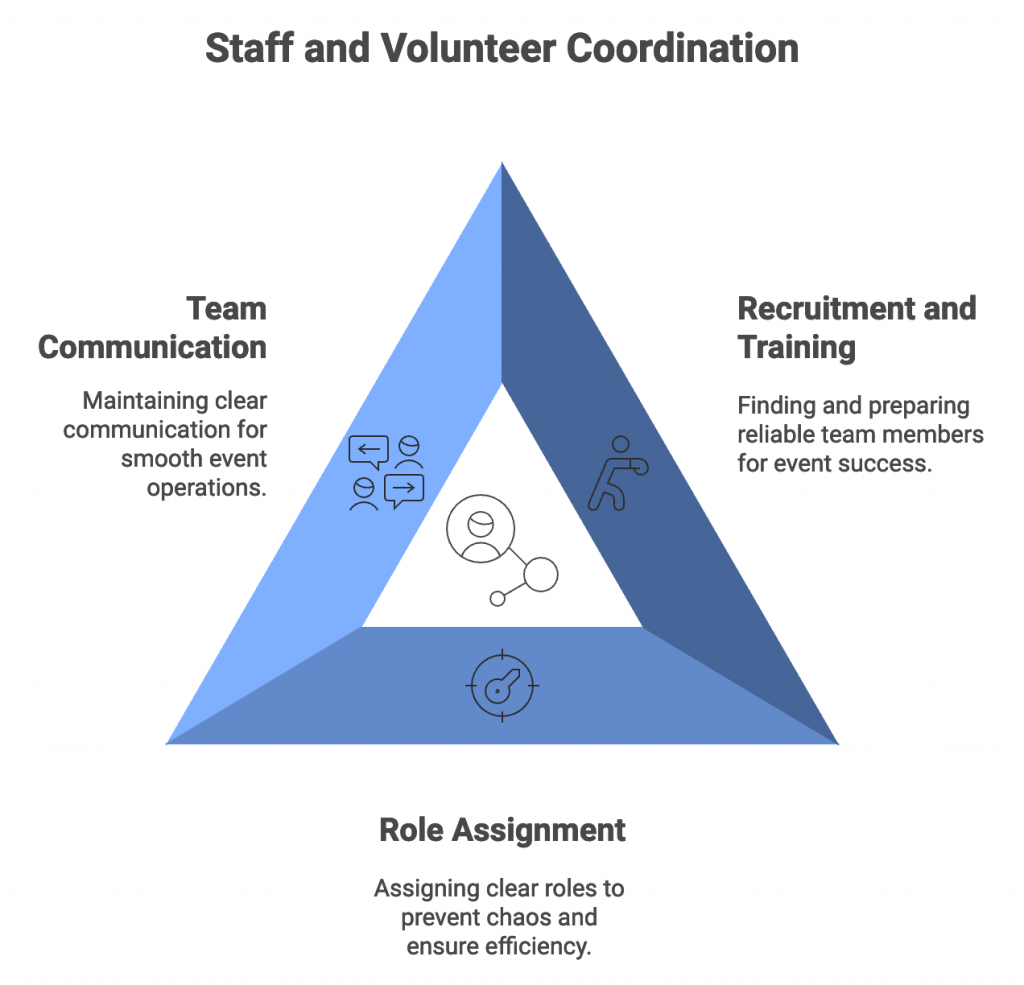Sports Event Management: Job Description and Key Responsibilities
Picture this: you ensure everything goes right at the biggest games, whether the Super Bowl, the X Games, or even a Nike-sponsored marathon. That’s what sports event managers do – they’re the masterminds who ensure everything, from stadium lights to ticket sales, is on point. Whether it’s setting up for the NBA All-Star Weekend or pulling together a local high school championship, sports event managers are the ones making sure fans, players, and sponsors all have a blast. If you’re organized, love sports, and get a thrill from seeing ideas come to life, a job in sports event management might just be calling your name.
Job Description: What to Expect as a Sports Event Manager
So, what exactly does a sports event manager do? Here’s the scoop on the main responsibilities:
- Planning and Coordination. You’re in charge from the first idea until the last fan leaves. This means everything from creating the event schedule to coordinating with vendors, sponsors, and teams.
- Budgeting and Finance. Money matters! You’ll manage the event budget, ensure costs stay controlled, and work with sponsors for additional funding.
- Marketing and Promotion. Working with brands like Red Bull or ESPN to promote the event, drive ticket sales, and create buzz online.
- Stakeholder Collaboration. You’ll work with athletes, coaches, vendors, and sponsors to bring it together – a mix of people skills and serious multitasking.
- Game-Day Operations. On the day of the event, you’re the point person, solving issues and keeping things running smoothly. If a scoreboard malfunctions at the last minute, you handle it!

Key Responsibility #1: Event Planning and Logistics
Imagine planning an event at Madison Square Garden for an NBA game or setting up a field for a high-stakes high school championship. Every detail counts, and planning is where it all starts.
- Venue Selection. Whether you’re booking the Barclays Center in Brooklyn or a local sports field, you need to find a spot that’s big enough, accessible, and has all the amenities (think parking, seating, media areas).
- Scheduling. Picking the right date and time is crucial. For example, Super Bowl organizers plan years in advance, considering factors like weather, TV schedules, and other events to avoid conflicts.
- Equipment and Setup. Picture yourself organizing the lights, speakers, seating, and media setups for a stadium. As the event manager, you coordinate all the necessary equipment and make sure everything’s in place before the crowd arrives.
Key Responsibility #2: Budgeting and Financial Management
Handling finances is a crucial part of sports event management. You’ll need to be organized and resourceful to manage events like the U.S. Open or the Boston Marathon without exceeding budget.
- Cost Management. Controlling costs is crucial. For example, organizers of events like the Chicago Marathon often work with city officials and sponsors like Nike or Gatorade to ensure they have the necessary resources without blowing their budget.
- Sponsorships and Partnerships. Big events like the Olympics or Formula 1 races run on sponsorships. As the event manager, you’ll work with companies like Coca-Cola or Visa to secure the funds or services required for the event.
- Ticketing and Revenue Tracking. Managing ticket sales is essential for event profitability. Whether handling a small college game or a significant arena event, you need to track ticket revenue and assess financial success.

Key Responsibility #3: Marketing and Audience Engagement
Let’s be real – an event isn’t much if no one shows up. That’s where marketing comes in. You’ll work with social media teams, influencers, and even celebrities to spread the word and excite fans.
- Promotion Strategy. Events like Red Bull’s extreme sports competitions and ESPN’s College GameDay broadcasts are massive because of effective promotion. You’ll collaborate with marketing teams to create a plan that grabs attention and sells tickets.
- Social Media & Digital Marketing. When the NBA promotes All-Star Weekend, they go all-out on platforms like Instagram, Twitter, and TikTok. As the event manager, you’ll oversee digital campaigns, post updates, and keep fans in the loop.
- Audience Engagement. Fan zones, live polls, and interactive experiences are a giant part of sports events. Look at how the NFL engages fans with interactive fan zones at the Super Bowl. Your job is to create memorable experiences that fans talk about long after the game.
Key Responsibility #4: Staff and Volunteer Coordination
No event runs without a solid team. Whether it’s volunteers helping at a local race or a professional crew at a stadium, you’ll need to recruit, train, and coordinate everyone involved.
- Recruitment and Training. Thousands of volunteers and staff must be organized at events like the New York City Marathon. You’ll need to find reliable team members, train them, and ensure they know what to do.
- Role Assignment. You’re like the coach for event day, assigning roles to everyone, from ticket checkers to security. Clear roles prevent chaos, so everyone knows where they’re needed.
- Team Communication. Communication is the backbone of a smooth event. During events like the PGA Tour, for example, the event manager keeps everyone connected to handle any changes or needs on the fly.

Key Responsibility #5: Managing On-the-Day Operations
The big day is finally here! This is when all your planning comes to life. You’re the go-to person for any situation, from handling VIP guests to solving last-minute issues.
- Event Monitoring. For events like the Olympics, where things need to run like clockwork, you’ll watch everything, ensuring it goes smoothly.
- Problem-Solving. The unexpected can always happen, no matter how much you plan. Whether there is a weather delay at the U.S. Open or a technical glitch during a live broadcast, a quick-thinking attitude is vital.
- Post-Event Wrap-Up. There’s still work to do after the fans leave. You’ll oversee cleanup, gather feedback, and analyze what went well and what could improve next time. This is the secret sauce for building future success.
Skills Needed to Succeed as a Sports Event Manager
To make it in sports event management, you need a mix of technical and personal skills. Here’s what successful managers at places like the NFL, MLB, and major marathons bring to the table:
- Attention to Detail. Details make or break an event. You must spot potential issues and handle everything down to the smallest item.
- Problem-Solving. The unexpected can always happen, no matter how much you plan. Whether there is a weather delay at the U.S. Open or a technical glitch during a live broadcast, a quick-thinking attitude is vital.
- People Skills. You’ll interact with corporate sponsors and security staff. Knowing how to communicate, collaborate, and stay calm under pressure will make your job much easier.
- Time Management. Between balancing budgets and keeping up with deadlines, you must juggle multiple tasks to pull off a seamless event.
- Adaptability. Flexibility is crucial in an industry where things can change in seconds. Stay ready to switch gears when necessary, especially during live events.

Typical Career Path for Sports Event Managers
Curious about how to turn your passion into a career? Here’s how many pros make it into the world of sports event management:
- Entry-Level Positions. Numerous candidates start as interns or assistants at sports organizations like ESPN, Nike, or MLS teams. This is where you get your first taste of event planning and learn the basics.
- Building Experience. Working on various events helps you grow. You might start with small community games and work up to significant events like the NBA playoffs. The more events you manage, the more confident and skilled you become.
- Career Growth. After gaining experience, sports event managers can move up to senior roles, such as head event coordinator or director of events. These roles often involve managing larger teams and handling major events, like a Super Bowl halftime show or a Formula 1 race.
The Thrill and Challenges of Sports Event Management
Sports event management is high-energy, intense, and incredibly rewarding. Imagine standing in a stadium, hearing the crowd roar, and knowing you helped make it happen. Sure, it can be challenging, and things don’t always go as planned, but for those who love sports, there’s nothing quite like it. With hard work, a passion for the game, and the skills to stay cool under pressure, sports event management can be a career you’ll love – and one that fans and athletes will remember long after the game.



